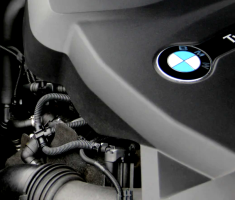
—
A BMW class action lawsuit will proceed in court after two owners sued over allegedly defective coolant leaks from defective coolant hoses.
The BMW coolant leak lawsuit was filed in June 2023 and dismissed in June 2024 because the plaintiffs failed to adequately allege a defect. But the dismissal was without prejudice which gave the plaintiffs another opportunity to modify and refile their lawsuit.
And while this latest version of the coolant hose lawsuit wasn’t dismissed, the judge did dismiss nationwide claims, which means no nationwide coolant leak class action lawsuit.
According to the coolant leak lawsuit, the hoses prematurely fail in these vehicles:
- 2017-2021 BMW 230i
- 2017-2021 BMW 320i
- 2017-2021 BMW 330i
- 2017-2021 BMW 430i
- 2017-2021 BMW 530i
- 2017-2021 BMW 540i
The lawsuit alleges BMW knew the coolant hoses could fail but the automaker failed to warn consumers about the risk. Faulty coolant hoses lead to coolant leaks which lead to overheated engines.
BMW customers may be forced to pay thousands of dollars for repairs related to coolant leaks, and the plaintiffs also contend their vehicles have lost value because the coolant hoses can fail.
Motion to Dismiss the BMW Coolant Leak Lawsuit
The judge did not dismiss the lawsuit this time because the refiled lawsuit has the plaintiffs claming, “[t]he coolant lines in the Class Vehicles are defective because they prematurely wear at an accelerated rate due to both thermocycling and electrochemical degradation.”
Judge Julien Xavier Neals says at this stage he must accept the allegations as true and “construed in favor of Plaintiffs.” So this time the lawsuit alleges a specific defect, causing the judge to deny BMW’s motion to dismiss for failure to allege a defect.
However, nationwide breach of warranty, common law fraud, and unjust enrichment claims were dismissed. BMW argued the nationwide class allegations should be dismissed because the plaintiffs “lack standing to assert claims on behalf of putative classes under the laws of states where no named plaintiff is located.”
“Indeed, ‘named plaintiffs who represent a class must allege and show that they personally have been injured, not that injury has been suffered by other, unidentified members of the class to which they belong and which they purport to represent.'” — Judge Neals
According to the judge:
“Otherwise, ‘a plaintiff would be able to bring a class action complaint under the laws of nearly every state . . . without having to allege concrete, particularized injuries relating to those states, thereby dragging defendants into expensive nationwide class discovery, potentially without a good-faith basis.'”
The judge agreed with BMW and ruled the plaintiffs are “limited to asserting claims on behalf of individuals in states where at least one named Plaintiff has standing for a claim.” Currently those states are California and Florida only.
Other claims were also dismissed, including a claim for breach of the Magnuson-Moss Warranty Act which requires 100 named plaintiffs. The judge referenced the Third Circuit which explained for purposes of establishing subject matter jurisdiction, the Warranty Act requires that a claim identify 100 named plaintiffs.
However, the BMW coolant leak lawsuit identified only two named plaintiffs.
The plaintiffs had a little better success with certain fraud claims against BMW by claiming the automaker knew about the allegedly defective coolant hoses before the vehicles were first sold.
The judge did shoot down the claim BMW had presale knowledge through “pre-production durability testing” of the vehicles. According to the plaintiffs, BMW knew about allegedly defective coolant hoses, but BMW told the judge the allegations are “excessively broad and largely unrelated to the alleged defect.”
The judge agreed and found the testing allegations in the lawsuit “lack specificity that could plausibly infer the coolant lines defect would have been identified.”
The two plaintiffs also assert BMW knew about the coolant hoses and leaks based on 31 complaints filed with the National Highway Traffic Safety Administration. BMW argues 31 complaints out of all the vehicles isn’t enough to allege BMW knew the coolant hoses were defective before the two plaintiffs purchased their vehicles.
BMW also told the judge for one plaintiff, all the consumer complaints filed with NHTSA, except one, were filed after the plaintiff purchased his vehicle.
The judge ruled for that plaintiff, “consumer complaints [are] insufficient to establish prior knowledge of the alleged defect.”
But for the other plaintiff, less than one third of the complaints were filed before the plaintiff purchase his BMW. The judge ruled because he must take “that allegation as true,” those complaints are sufficient to allege BMW had presale knowledge of the alleged coolant hose defect before that plaintiff purchased his vehicle.
The BMW coolant leak lawsuit was filed in the U.S. District Court for the District of New Jersey: Shea Armstrong v. BMW of North America, LLC, et. al.
The plaintiff is represented by Sauder Schelkopf LLC.

